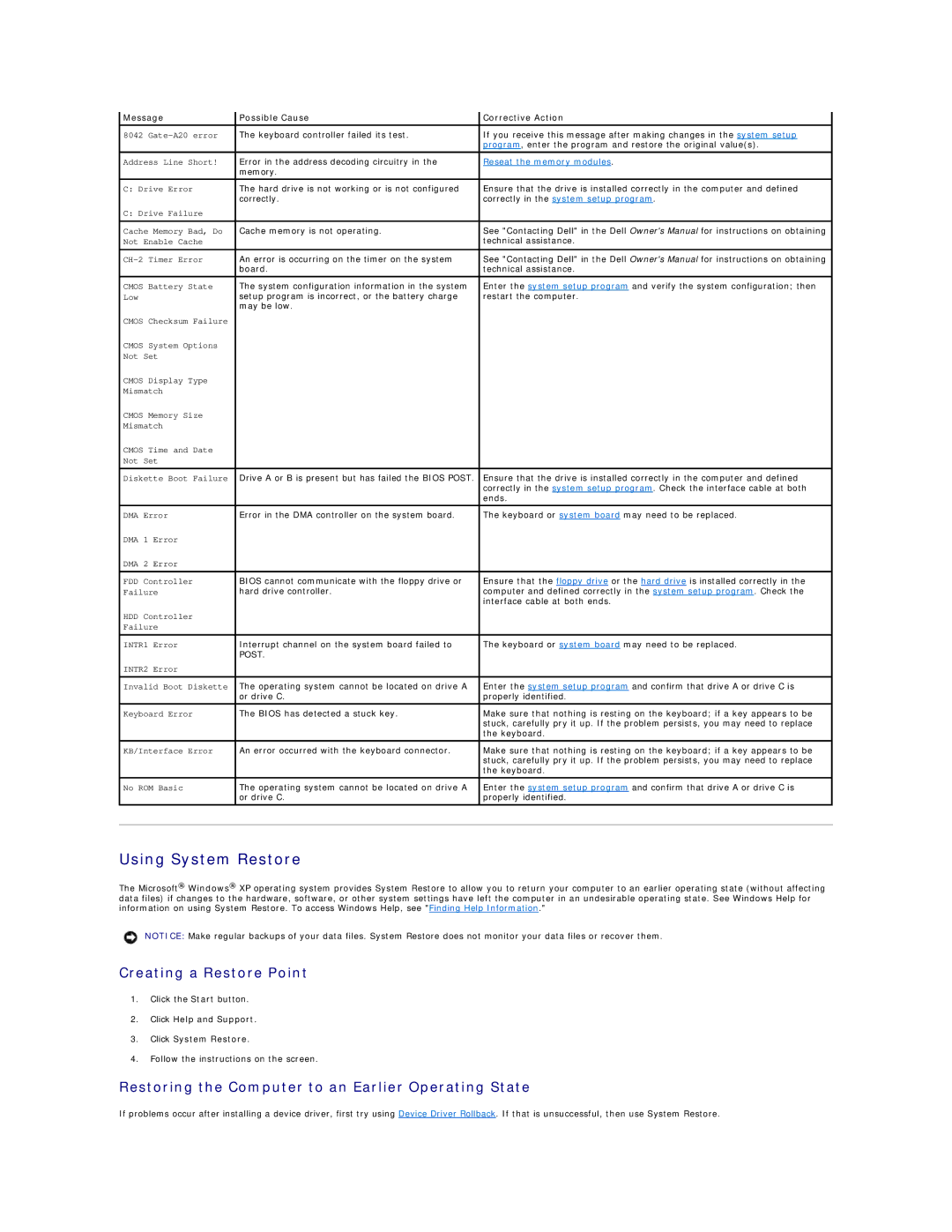Message | Possible Cause | Corrective Action |
8042 | The keyboard controller failed its test. | If you receive this message after making changes in the system setup |
|
| program, enter the program and restore the original value(s). |
|
|
|
Address Line Short! | Error in the address decoding circuitry in the | Reseat the memory modules. |
| memory. |
|
C: Drive Error | The hard drive is not working or is not configured | Ensure that the drive is installed correctly in the computer and defined |
| correctly. | correctly in the system setup program. |
C: Drive Failure |
|
|
|
|
|
Cache Memory Bad, Do | Cache memory is not operating. | See "Contacting Dell" in the Dell Owner's Manual for instructions on obtaining |
Not Enable Cache |
| technical assistance. |
|
|
|
An error is occurring on the timer on the system | See "Contacting Dell" in the Dell Owner's Manual for instructions on obtaining | |
| board. | technical assistance. |
CMOS Battery State | The system configuration information in the system | Enter the system setup program and verify the system configuration; then |
Low | setup program is incorrect, or the battery charge | restart the computer. |
| may be low. |
|
CMOS Checksum Failure |
|
|
CMOS System Options |
|
|
Not Set |
|
|
CMOS Display Type |
|
|
Mismatch |
|
|
CMOS Memory Size |
|
|
Mismatch |
|
|
CMOS Time and Date |
|
|
Not Set |
|
|
|
|
|
Diskette Boot Failure | Drive A or B is present but has failed the BIOS POST. | Ensure that the drive is installed correctly in the computer and defined |
|
| correctly in the system setup program. Check the interface cable at both |
|
| ends. |
|
|
|
DMA Error | Error in the DMA controller on the system board. | The keyboard or system board may need to be replaced. |
DMA 1 Error |
|
|
DMA 2 Error |
|
|
FDD Controller | BIOS cannot communicate with the floppy drive or | Ensure that the floppy drive or the hard drive is installed correctly in the |
Failure | hard drive controller. | computer and defined correctly in the system setup program. Check the |
|
| interface cable at both ends. |
HDD Controller |
|
|
Failure |
|
|
|
|
|
INTR1 Error | Interrupt channel on the system board failed to | The keyboard or system board may need to be replaced. |
| POST. |
|
INTR2 Error |
|
|
|
|
|
Invalid Boot Diskette | The operating system cannot be located on drive A | Enter the system setup program and confirm that drive A or drive C is |
| or drive C. | properly identified. |
|
|
|
Keyboard Error | The BIOS has detected a stuck key. | Make sure that nothing is resting on the keyboard; if a key appears to be |
|
| stuck, carefully pry it up. If the problem persists, you may need to replace |
|
| the keyboard. |
KB/Interface Error | An error occurred with the keyboard connector. | Make sure that nothing is resting on the keyboard; if a key appears to be |
|
| stuck, carefully pry it up. If the problem persists, you may need to replace |
|
| the keyboard. |
|
|
|
No ROM Basic | The operating system cannot be located on drive A | Enter the system setup program and confirm that drive A or drive C is |
| or drive C. | properly identified. |
|
|
|
Using System Restore
The Microsoft® Windows® XP operating system provides System Restore to allow you to return your computer to an earlier operating state (without affecting data files) if changes to the hardware, software, or other system settings have left the computer in an undesirable operating state. See Windows Help for information on using System Restore. To access Windows Help, see "Finding Help Information."
NOTICE: Make regular backups of your data files. System Restore does not monitor your data files or recover them.
Creating a Restore Point
1.Click the Start button.
2.Click Help and Support.
3.Click System Restore.
4.Follow the instructions on the screen.
Restoring the Computer to an Earlier Operating State
If problems occur after installing a device driver, first try using Device Driver Rollback. If that is unsuccessful, then use System Restore.
